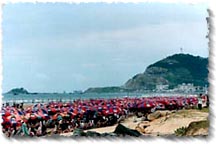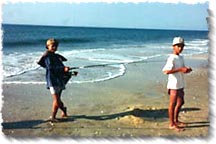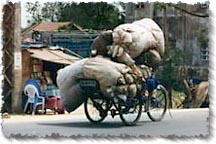Vietnam Adventures - Escape from Saigon
 ur weekend escape gets off
to a rough start in a Vung Tau jail, being interrogated by three guys in ill-fitting
pea-green uniforms that look more appropriate for a brain surgeon than a Vietnamese
cop. It doesn't appear we're going to get out of here anytime soon. First, there
is the problem of the translator. She's my buddy's - and now fellow con's -
Vietnamese wife, so she isn't exactly a U.N. Security Council play-by-play candidate.
I imagine it's similar to Jesse Helms translating a conversation between Bill
Clinton and Fidel Castro: "The President said, 'The boy's staying here, you
pinko, commie son-of-a-&%$#!'"
ur weekend escape gets off
to a rough start in a Vung Tau jail, being interrogated by three guys in ill-fitting
pea-green uniforms that look more appropriate for a brain surgeon than a Vietnamese
cop. It doesn't appear we're going to get out of here anytime soon. First, there
is the problem of the translator. She's my buddy's - and now fellow con's -
Vietnamese wife, so she isn't exactly a U.N. Security Council play-by-play candidate.
I imagine it's similar to Jesse Helms translating a conversation between Bill
Clinton and Fidel Castro: "The President said, 'The boy's staying here, you
pinko, commie son-of-a-&%$#!'"
My Thai wife, who'd only the previous day flown over to Saigon to be with
me for a month, is not amused. (Welcome to Vietnam, honey!) Convinced she's
Vietnamese, the cops are bemused and angered by what they gleaned to be a feigned
inability to speak Vietnamese.
 The
four of us were bound for Vung Tau on two motorcycles when we were stopped earlier
by a couple of street cops near Vung Tau's Back Beach. The situation would normally
not have been much cause for alarm. Our bikes were 750cc cruisers. Of course,
the Vietnamese gendarme are not fond of anything being ridden around more than
175cc - namely because it's illegal. But with the right paperwork - which, of
course, we didn't possess - you're generally sent on your way. Even without
the proper documents, you're generally sent on your way - after payment of a
small gratuity. Both myself and Luke (not his real name, because the guy flirts
with "persona non grata" in Vietnam like some Westerner handing out pro-democracy
leaflets at a crowded Rangoon pagoda) hadn't converted our international driver
licenses into Vietnamese licenses, as the law requires. Still, a 10-spot to
the cops and we'd now be tossing down a couple of cold ones, but Luke had a
different idea.
The
four of us were bound for Vung Tau on two motorcycles when we were stopped earlier
by a couple of street cops near Vung Tau's Back Beach. The situation would normally
not have been much cause for alarm. Our bikes were 750cc cruisers. Of course,
the Vietnamese gendarme are not fond of anything being ridden around more than
175cc - namely because it's illegal. But with the right paperwork - which, of
course, we didn't possess - you're generally sent on your way. Even without
the proper documents, you're generally sent on your way - after payment of a
small gratuity. Both myself and Luke (not his real name, because the guy flirts
with "persona non grata" in Vietnam like some Westerner handing out pro-democracy
leaflets at a crowded Rangoon pagoda) hadn't converted our international driver
licenses into Vietnamese licenses, as the law requires. Still, a 10-spot to
the cops and we'd now be tossing down a couple of cold ones, but Luke had a
different idea.
"That's extortion!" Luke barked at the traffic cops after they'd suggested
a small 'fine'. "You're breaking your own damn laws! I'm an American citizen,
and I have rights!"
Maybe, but not here.
I cringed. We Americans tend to think it's our God-given right to ACLU lawyers,
factory rebates, tax refunds, Big Macs, zero down and 4-percent APR financing
anywhere on the planet. But the fact is Vietnamese cops don't care if you're
from Pluto, as Plutonian rights are generally observed solely on Pluto. Luke's
wife, Le (also not her real name, because she flirts with a stint in a re-education
camp like some local handing out pro-democracy leaflets at Ho Chi Minh's mausoleum),
is married to an American and also expects zero down and 4% APR financing anywhere
on the planet
One thing leads to another, and we were busted. Five hours and $200 later,
we're on the road again, but Vung Tau has lost what little appeal it has. My
wife, Kai (her real name, because she only flirts with me), doesn't like the
place. She's frightened the jailhouse scene will be repeated the next time we
come across a traffic cop and we'll wind up spending the weekend behind bars
instead of sipping drinks in them.
We head for Long Hai, a smaller beach community some 35 klicks to the northeast.
Long Hai pans out to be the silver lining of our newly-anointed status as felons,
though at first, it's not entirely evident. It's a gritty little coastal place,
whose population mostly ekes out a living paddling around the swells in overturned
fruit baskets in search of eels and crabs, or anything else they can hook or
coax out of the sea.The roads are muddy and lined with dilapidated restaurants,
sundry stalls and motorbike repair shops.
The main road forks in the center of town. Most beachgoers take the right
fork for the half-klick ride to Long Hai's silty beach. To paraphrase another
American, we take the road less traveled and it makes all the difference.
We meander along the uncrowded coastline, unsure what lies ahead. The South
China Sea becomes a more vivid blue the farther we stray from Vung Tau and the
mouth of the Saigon River. Rolling, bolder-pocked hills swoop down to the palm-lined
beaches, interrupted by craggy rock outcroppings. The backdrop of rugged mountains
is distinctly California in appearance. The beaches are nearly deserted, save
for the occasional minibus from Saigon that has staked out its own isolated
strip of clean, white sand.
 After
a few kilometers, we stumble upon the diamond in Long Hai's rough - the Thuy
Dong Resort. Isolated and tucked between the hills and the beach, it's a world
away from the muck of Long Hai town and the cops of Vung Tau. Tidy bungalows
dot the casuarina- and palm-lined beach, which hide the resort's main building.
The ubiquitous seafood, chewing gum and soda pop hawkers of Vung Tau and Long
Hai beach are nowhere in sight. We've found our place in the sun (though no
one in Vietnam actually sits out in the sun).
After
a few kilometers, we stumble upon the diamond in Long Hai's rough - the Thuy
Dong Resort. Isolated and tucked between the hills and the beach, it's a world
away from the muck of Long Hai town and the cops of Vung Tau. Tidy bungalows
dot the casuarina- and palm-lined beach, which hide the resort's main building.
The ubiquitous seafood, chewing gum and soda pop hawkers of Vung Tau and Long
Hai beach are nowhere in sight. We've found our place in the sun (though no
one in Vietnam actually sits out in the sun).
At the reception desk, we bicker over room prices "Please don't get us arrested
again, Wink," Kai pleads in a whisper. She's convinced the Vietnamese authorities
arrest foreigners at the drop of a hat. (To get arrested in Thailand, you've
got to assassinate someone - then turn yourself in!) We spend the rest of the
waning afternoon devouring fresh steamed crab and spring rolls. Nightlife in
Long Hai is about as hoppin' as a Cao Dai prayer service. We turn in early.
The next morning we backtrack to Ba Ria and head north toward Binh Chau. We
reach the coast and Ho Coc Beach, completely devoid of foreigners. Three-plus
hours out of Saigon, Ho Coc is even more remote and less developed than Long
Hai. But the number of tour buses indicates that someone's been spreading the
word. But the vast beach is clean and the sea the color of the sky.
We overnight at the remote Binh Chau Hot Springs (Cumi Binh Chau Resort),
about 50 klicks northeast of Long Hai. Arriving early gives us time to wander
along the maze of sand paths stretching some three kilometers through the bush
to the springs. Water from the springs is pumped into a large pool at this so-called
resort, which is badly in need of new paint, better yet, a bulldozer and new
architect. Also unsightly are the monkeys and birds trapped in cages by the
picnic tables for enjoyment of the visiting Saigonese. In Vietnam, pets are
caged, stuffed or served for dinner.
After our own dinner, I'm tempted to liberate a baby macaque monkey from its
rusted steel confines but am met with a now familiar refrain from Kai: "Please
don't get us arrested again, Wink." So instead of sabotaging Cumi's makeshift
zoo, I join the rest of the group for a midnight plunge into the near-boiling
hot springs pool. In 10 minutes, I'm asleep - in the pool.
 At
dawn we pack up and again head back to Ba Ria for the final leg of our journey,
a beautiful 55-km stretch of pavement that ends up at National Highway 1 at
Xuan Loc. We take a slight detour to visit the Long Phuoc tunnels. Virtually
unknown to foreign tourists but highly significant to Vietnam War vets, the
tunnels were dug by the VC around the perimeter of Australian and American military
bases. About 200 meters of the tunnels are open to the few tourists who arrive
here. There are three levels of passages, including gun vents, medical stations
and sleeping areas. Unlike those at Cu Chi, the tunnels here have not been enlarged
to accommodate Westerners.
At
dawn we pack up and again head back to Ba Ria for the final leg of our journey,
a beautiful 55-km stretch of pavement that ends up at National Highway 1 at
Xuan Loc. We take a slight detour to visit the Long Phuoc tunnels. Virtually
unknown to foreign tourists but highly significant to Vietnam War vets, the
tunnels were dug by the VC around the perimeter of Australian and American military
bases. About 200 meters of the tunnels are open to the few tourists who arrive
here. There are three levels of passages, including gun vents, medical stations
and sleeping areas. Unlike those at Cu Chi, the tunnels here have not been enlarged
to accommodate Westerners.
Also unlike at Cu Chi, our guide isn't dressed like he's ready to blow away
some American GIs. In fact, "he" is a "she" (named Hoa) who can barely utter
a word of English and is dressed like she's been invited to afternoon tea. Hoa's
surprised to see us - she sees only a few groups of Westerners a year. She gives
us a brief tour of the tunnels and describes with unnerving accuracy the weaponry
found in the small, adjoining museum. Perhaps she's not as dainty as she appears.
We leave the tunnels and continue 5 kilometers further to the former Nui Dat
Battlefield in Long Than village. Now a rubber tree plantation, this was the
scene of vicious fighting between the VC and Australian and New Zealand troops
in August 1966. However, the local People's Committee won't let us into the
site unless we fork over 15 bucks each.
We pass and return to the main road to Xuan Loc. About halfway between Ba
Ria and Xuan Loc, we come across the 4000-year-old tomb at Hang On, said to
be the oldest in Vietnam and thought to house the ashes of an ancient ethnic
Hmong family from the Central Highlands. The grounds here are meticulously manicured.
There's nary a tourist, nor anyone else, in sight. In fact, the place is locked
up. I'm the only one of our group able to scale the wrought-iron fence around
the site. In 1987, the Vietnamese government sought to find out exactly who
was entombed here but couldn't manage to get the massive rock lid off the tomb.
"Please don't get us arrested again, Wink," Kai says nervously, convinced that
commie tomb cops are hiding in the rose bushes. I ignore her missives and try
to pry off the lid as well, but meet the same results as the government.
Off-the-beaten path, and about as far out of Saigon as you'd be willing to
go if you had a compelling reason to get back, which Luke does: it's Sunday
and he has to be behind his Saigon desk Monday morning.
It's dark by the time we reach the outskirts of Saigon. Our group is exhausted
and powdered in truck exhaust as we roll across the Korean Bridge - and into
a traffic cop who waves us down.
"Can I see your papers, please?" he snarls in Vietnamese.
Luke starts to say something. I slap his chest. "Tell this guy about your
rights as an American and I'm gonna belt 'ya," I snap.
I fumble for my wallet, pull out five one dollar bills, and politely hand
them to the cop.
"These are my papers," I say.
They are in order. 
Although Vung Tau and Long Hai are both popular day trips from Saigon, neither
is particularly worthwhile for a longer stay. It makes far more sense to explore
the coastal region to the north where few foreign travelers venture.
About a kilometer east of Ba Ria the road forks - the right fork runs to Long
Hai and the left fork shoots 48 km to Binh Chau. In Long Hai, the road forks
again. To reach the Thuy Duong Resort, take the left fork. The resort is about
3 km ahead. To reach Ho Coc, backtrack toward Ba Ria and head north toward Binh
Chau. Ho Coc Beach is 35 km up the road, Binh Chau is 13 km further and it's
another 6 km to the Cumi Resort.
The final leg of this interesting journey is the beautiful 55-km stretch
of pavement that begins at Ba Ria and ends up at Xuan Loc at National Highway
1. The road begins at the large Catholic church in downtown Ba Ria. Head north
to where the road splits. The left fork heads to Xuan Loc, while the Long Phuoc
Tunnels can be reached by detouring a few kilometers along the right fork. The
Nui Dat Battlefield is 5 km past the tunnels. To reach Hang On Tomb, double
back and head toward Xuan Loc. The tomb is about halfway between Ba Ria and
Xuan Loc.
You can hire a private car or minivan for the weekend or book an overnight
trip to Cumi Binh Chau Resort with a stop at Ho Coc Beach, departing Saturday
morning and returning Sunday afternoon, through Vyta Tours in Saigon. Contact
us for details.

About the Author
Wink Dulles is the author or co-author of eight guidebooks for Fielding
Worldwide, including Fielding's Vietnam (Including Laos & Cambodia), and
the best-seller The World's Most Dangerous Places. His exploits have been
featured in Outside Magazine and TIME Magazine, and he has appeared
numerous times on CNN news and feature broadcasts as an analyst on
Southeast Asian affairs. His own articles have appeared in National
Geographic Traveler, Escape, Business Traveller, The Chicago Tribune, New
York Newsday, the Detroit Free Press, Adventure Journal and numerous other
major dailies and magazines. He currently pens a regular column for the
Toronto Sun, Action Asia and Trips Magazine.
Dulles personally arranged the
extraction of ABC Nightline anchor Ted Koppel from war-torn Cambodia in
1997 and guided the first American motorcycle tour of Vietnam in 1996. He
is also a co-host of the upcoming Discovery Channel series, "The World's
Most Dangerous Places," based on the book Robert Young Pelton and Dulles
co-wrote. Dulles lives on his northeastern Thailand ranch.





